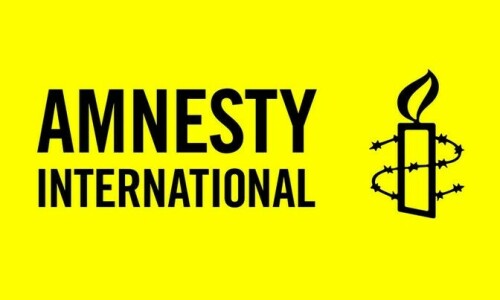Amnesty International stated on Wednesday that “as human rights violations and abuses remain rampant,” Pakistan is scheduled for its second review by the UN Human Rights Committee in Geneva on October 17 and 18.
The rights group said in a statement that the review falls under the International Covenant on Civil and Political Rights (ICCPR), to which the nation is a party.
According to Babu Ram Pant, the Deputy Regional Director for South Asia of Amnesty International, “Pakistan’s review comes at a crucial time for the country, as human rights violations and abuses remain rampant.”
“In the past month alone, there have been reports of two extrajudicial police executions for blasphemy, a crackdown on protests, the Peaceful Assembly and Public Order Act 2024, arbitrary detention and mass arrests of opposition workers and leaders, a ban on the Pashtun Tahaffuz Movement (PTM), and harassment of human rights defenders like Mahrang Baloch.
“The audit presents a chance for the Pakistani government to assess the condition of common freedoms in the nation and execute substantial measures to address the basic liberties concerns raised during the survey.”
The PTM was banned by the government on October 6 because it posed a threat to national security and peace.
According to the Pakistani Associated Press, Section 11B of the Anti-Terrorism Act of 1997 deemed the PTM “unlawful.” The PTM was being added to the First Schedule of the ATA as a prohibited organization, according to a notification from the interior ministry, which stated that the PTM posed a “significant danger” to the country’s public order and safety.
However, with a few caveats, the federal government agreed to lift the ban in principle on October 10.
Sources expressed that since a specific technique must be followed for lifting the boycott, it was concluded that the warning of the boycott would be, for the present, ‘held in suspension’.
According to the sources, it was also agreed upon that the “proscribed” PTM would be permitted to hold its October 11 Pashtoon Qaumi Jirga.
Amnesty International had issued a call on October 8 for Pakistani authorities to lift the PTM ban, describing it as “an affront on the rights to freedom of association and peaceful assembly in the country.”
Extrajudicial executions Amnesty International had also demanded a “thorough, impartial, and independent” investigation into the recent two police executions of blasphemy suspects in Sindh and Balochistan.
Abdul Ali was gunned down by police constable Saad Khan Sarhadi on September 12 inside the Cantt Police Station lockup in Quetta for blasphemy.
A week later, in a so-called “encounter” in Mirpurkhas, police shot and killed Umerkot-based doctor Shah Nawaz Kunhbar. Zealots pursued his family as they handed over the body, snatching it and lighting it on fire.
Dr. Mahrang Baloch, a Baloch rights activist, was charged with terrorism on Saturday for allegedly inciting others by making “allegations against security institutions.”
Nine militant groups, including the Balochistan Liberation Army (BLA), were named in the FIR, which claimed that Baloch was involved in their activities.
It stated, “The innocent Baloch men and women have been misled in the failed anti-state conspiracies.”
The case, according to Dr. Mahrang, was “fabricated” and demonstrated “how the state has grown increasingly uncomfortable” with her activism, she said.
She was prevented from boarding a flight to New York on October 8 by immigration officials at Karachi’s Jinnah International Airport, where she was scheduled to attend a Time magazine event. The leader of the Baloch Yakjehti Committee was included on the “2024 Time100 Next” list published by Time for “advocating peacefully for Baloch rights.”
The Sindh High Court stopped the police from arresting or harassing Dr. Mahrang on Monday. Through her attorney, Jibran Nasir, she filed two petitions for the quashing of an FIR that had been filed against her and for the opening of an investigation into specific police officers for allegedly assaulting her and her companions, stealing her passport, and taking her phone within the jurisdiction of the Airport police station.
As a result of the FIR that was filed against the petitioner, a bench consisting of two judges and headed by Justice Salahuddin Panhwar prevented the police from taking any coercive action against her.



